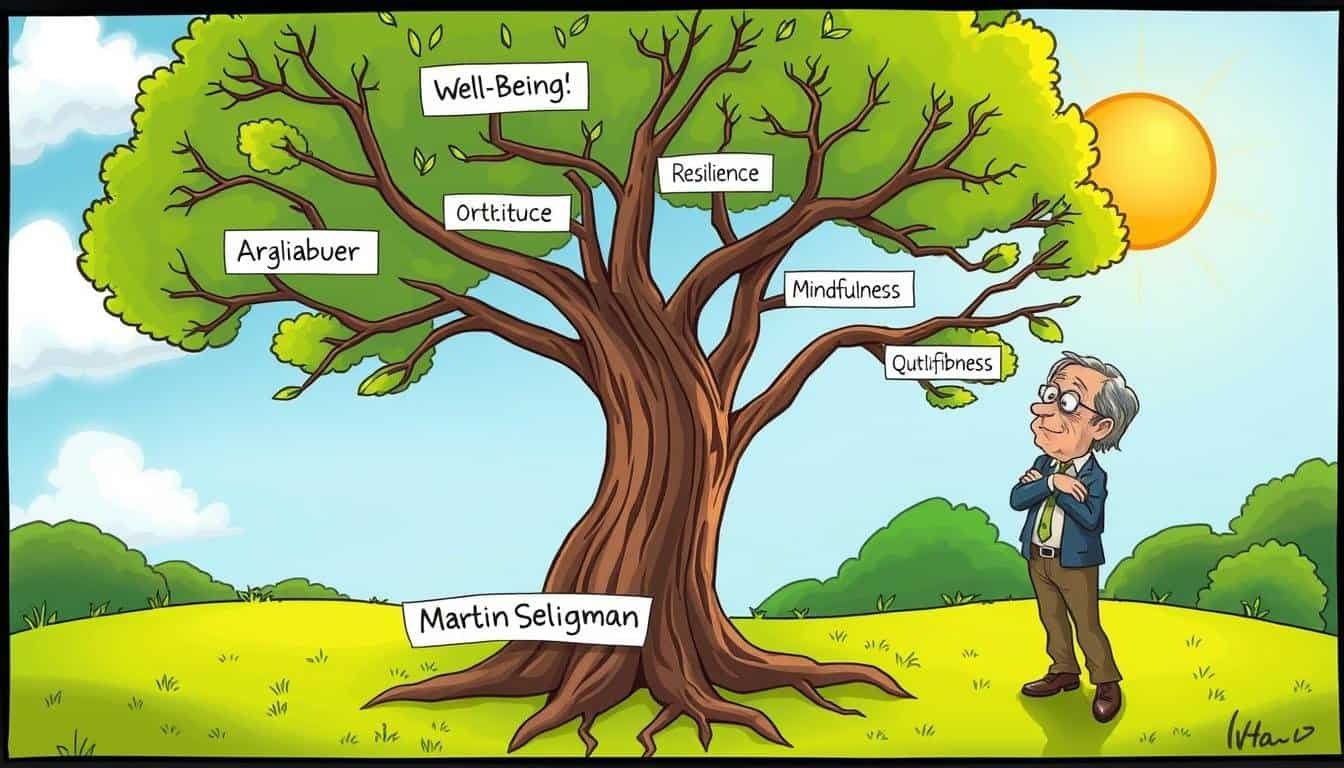Martin Seligman: Well-Being and Positive Psychology
“The aim of positive psychology is to shift our focus from just fixing problems to building the best qualities in life.” – Martin Seligman
Martin Seligman, the founder of positive psychology, changed how we think about mental health. He moved us from just treating illness to promoting happiness and satisfaction with life.
Seligman created the PERMA model. It shows five key parts of being happy: Positive Emotion, Engagement, Relationships, Meaning, and Accomplishment. This model changed how we see and achieve well-being.
Studies show that being well does wonders. It helps you do better at work, have happier relationships, and stay healthier. Plus, you might even live longer! This proves the value of focusing on our mental health for more than just treating problems.
Positive psychology gives us ways to be more optimistic, stop anxiety and depression, and feel better about life. It’s not just about feeling happy. It’s about doing well in every part of life.
By looking into Seligman’s work and the PERMA model, we’ll find ways to improve our well-being. Let’s start our journey into positive psychology and learn to live fully.
Introduction to Martin Seligman and Positive Psychology
Martin Seligman changed psychology in 1998 when he took over as President of the American Psychological Association. His new approach focused on well-being instead of just mental illness. This started a new chapter in research and practice.
The Shift from Mental Illness to Well-Being
Seligman introduced Positive Psychology, a big change in the field. Psychologists started looking at what makes people happy and resilient. They wanted to help people thrive, not just get by.
Seligman’s Role in Founding Positive Psychology
Seligman is known as the father of Positive Psychology. He created the PERMA model, which highlights five key things for well-being: Positive Emotions, Engagement, Relationships, Meaning, and Achievement. His ideas have influenced many areas, like workplace wellness and military resilience.
The Importance of Flourishing in Psychology
Flourishing is a key idea in Seligman’s work. Positive Psychology focuses on building strengths and virtues to help people thrive. This approach has led to new ways to build resilience and improve life satisfaction.
| Course Aspect | Details |
|---|---|
| Enrollment | 116,068 participants |
| Duration | 16 hours |
| Rating | 4.9/5 (5,893 reviews) |
| Instructor Rating | 4.9/5 (1,385 ratings) |
Over 116,000 students have taken Seligman’s course on Well-Being and Positive Psychology. The high ratings show how valuable and impactful his teachings are. They help people understand and improve their life satisfaction and purpose.
The PERMA Model of Well-Being
Martin Seligman’s PERMA Model is a detailed way to look at well-being. It focuses on five key parts that help us feel good and satisfied with life.
Overview of the Five Elements
The PERMA Model includes Positive Emotion, Engagement, Relationships, Meaning, and Accomplishment. Each part is crucial for better well-being.
- Positive Emotion: Feeling joy and happiness
- Engagement: Getting fully into activities we enjoy
- Relationships: Creating strong bonds with others
- Meaning: Having a purpose in life
- Accomplishment: Reaching goals and celebrating successes
How PERMA Contributes to Flourishing
The PERMA Model helps us thrive by focusing on positive relationships, meaningful goals, and enjoying our activities. It encourages us to be optimistic and use our strengths for better well-being.
Measuring Well-Being through PERMA
Studies have found strong links between PERMA parts and well-being. A study at Purdue University showed some interesting results:
| PERMA Element | Factor Loading | Significance |
|---|---|---|
| Accomplishment | 0.76 | Highest |
| Positive Emotion | 0.65 | High |
| Engagement | 0.52 | Moderate |
| Relationships | 0.38 | Moderate |
| Meaning | 0.25 | Lowest |
These findings show how important each PERMA element is for our well-being. Accomplishments are most closely linked to feeling good.
Positive Emotion: The First Pillar of PERMA
Positive emotion is key in Martin Seligman’s PERMA model. It shows how happiness, joy, and optimism help us feel good. Studies say focusing on the good stuff in life can lower the risk of feeling anxious or depressed.
About 33% of people don’t feel hopeless when they face tough times, says Seligman. This shows how important optimism is for staying strong mentally. Being thankful and hopeful can also make us feel better about our lives.
- Practicing gratitude daily
- Engaging in hobbies that bring joy
- Spending quality time with loved ones
- Cultivating a sense of hope for the future
Positive feelings do more than just help our minds. They also make us stronger physically, intellectually, and socially. This fits with Seligman’s idea of flourishing – being at our best.
| Positive Emotion | Benefits |
|---|---|
| Joy | Increased creativity and problem-solving skills |
| Gratitude | Improved relationships and life satisfaction |
| Hope | Enhanced resilience and goal achievement |
| Optimism | Better physical health and longevity |
Adding these positive feelings to our everyday can make us happier and more fulfilled. The PERMA model helps us see and grow these key parts of a good life.
Engagement: Flow and Optimal Experience
Being engaged is key to feeling good, linked to the flow state. This is when we dive deep into an activity, losing track of time and our worries.
Csikszentmihalyi’s Concept of Flow
Mihaly Csikszentmihalyi, a psychologist, talked about flow. He said it’s being fully into a task. Challenges and skills match perfectly, creating a balance.
Engagement and Character Strengths
Our strengths help us reach flow. Using our best strengths in tough situations boosts our chance of this state. Knowing and using our strengths makes us more engaged in life and work.
Strategies to Increase Engagement
To get more into flow and be more engaged:
- Do activities you love
- Practice mindfulness to focus better
- Take time in nature to clear your mind
- Use your strengths every day
These tips can make you feel better and work better. Studies show that being engaged and using your strengths makes you happier and less depressed.
“The best moments in our lives are not the passive, receptive, relaxing times… The best moments usually occur if a person’s body or mind is stretched to its limits in a voluntary effort to accomplish something difficult and worthwhile.” – Mihaly Csikszentmihalyi
Relationships: The Social Component of Well-Being
Relationships are the heart of our social health and happiness. Martin Seligman, known as the father of positive psychology, says that having healthy relationships is key to being happy. The Harvard Study of Adult Development agrees, showing that close friends are more important than money, fame, or genes for long-term happiness.
Creating strong support networks is crucial for doing well. Being in real relationships and helping others can make us happier, as studies from Berkeley’s Greater Good Science Center show. Spending time with others is linked to feeling more satisfied with life, proving the value of our social ties.
Being close to others is essential for our daily happiness. Dan Kahneman, a Nobel Prize winner, found that being with loved ones and socializing are top activities for daily joy. This shows we should make meaningful connections a priority.
“Happy people tend to have more and better quality relationships, forming a self-reinforcing duo between relationships and happiness.” – Action for Happiness
To build stronger social ties, try these tips:
- Join groups or clubs that match your interests
- Listen actively and ask deep questions
- Get back in touch with old friends or family
- Volunteer to meet new people
Working on our relationships can greatly improve our social health and happiness. Remember, investing in our connections is vital for a happy life.
Meaning: Finding Purpose and Significance
Meaning is key to our happiness and life fulfillment. It gives us direction and helps us deal with life’s ups and downs. Martin Seligman, a leading figure in positive psychology, stresses the role of meaning in his PERMA model of well-being.
The Role of Meaning in Well-being
Studies show that feeling a sense of purpose can make us live longer, be happier, and stay healthier. This link between meaning and well-being shows how crucial it is to have purpose in our lives.
Sources of Meaning in Life
There are many ways to find meaning:
- Professional pursuits
- Social causes and activism
- Creative endeavors
- Spiritual or religious beliefs
- Personal relationships
Everyone finds meaning in different ways, based on their values and growth.
Cultivating a Sense of Purpose
Here are ways to find meaning:
- Get involved in causes you care about
- Explore new creative activities
- Use your passions to help others
- Spend quality time with loved ones
- Reflect on your values and align your actions with them
By actively seeking and building meaning, we can improve our well-being and live more satisfying lives. Remember, finding purpose is a journey that changes over time and through experiences.
Accomplishment: Achievement and Mastery
Feeling accomplished is key to feeling good about ourselves and growing as people. It’s about setting goals, pushing through tough times, and enjoying the success. Studies show that reaching our goals makes us happier and healthier.
Setting goals helps us achieve more. By making clear, reachable goals, we have a plan for success. This makes us more focused and motivated to beat challenges.
Perseverance is vital for making dreams come true. It keeps us going when things get hard. Research says those who keep going are more likely to reach their goals and feel better overall.
“The feeling of achievement can be attained by attempting new things and engaging in activities beyond one’s current skill set.”
Self-motivation pushes us towards our goals. It’s about wanting to do things for ourselves, not just for others. This kind of motivation helps us keep going, even when no one else is cheering for us.
| Accomplishment Strategy | Benefits |
|---|---|
| Setting SMART goals | Improved focus and clarity |
| Reflecting on past successes | Increased confidence and motivation |
| Celebrating achievements | Enhanced positive emotions and resilience |
Seeing accomplishment as a key part of being well helps us grow and feel fulfilled. Remember, achievements are personal and shouldn’t be compared to others. What’s important is celebrating your own journey to mastery.
Martin Seligman: Well-Being and Positive Psychology
Martin Seligman changed the way we think about well-being in psychology. Over thirty years, he wrote many papers and bestselling books on positive psychology. He showed that we can define, measure, and teach well-being using the PERMA model. This model includes Positive emotions, Engagement, Relationships, Meaning, and Accomplishment.
Seligman’s Contributions to Well-Being Theory
Seligman came up with a formula for happiness: H = S + C + V. Happiness comes from our genes, life events, and things we can control. His studies, using surveys and brain scans, have changed how we see well-being.
His Values in Action (VIA) Signature Strengths Survey has been taken by over eleven million people. It’s part of “Character Strengths and Virtues.”
The Impact of Positive Psychology on Mental Health
Positive psychology has greatly helped mental health. It fights pessimism and focuses on our strengths. This has helped soldiers with PTSD and reduced anxiety in Australian kids.
In therapy, positive psychology helps build resilience by focusing on strengths.
Applications of PERMA in Various Life Domains
The PERMA model is used in many areas. Companies like Metropolitan Life Insurance use it to find great salespeople. Schools use it to help students grow and thrive.
The extended PERMAH model, which includes health, works well in schools and workplaces. It shows how Seligman’s ideas can improve well-being in different parts of life.
Source Links
- PERMA™ Theory of Well-Being and PERMA™ Workshops
- The PERMA Model: Your Scientific Theory of Happiness
- Martin Seligman: How Positive Psychology can transform your life | THE BEHAVIOUR INSTITUTE
- Positive Psychology: Martin E. P. Seligman’s Visionary Science
- Application of the PERMA Model of Well-being in Undergraduate Students
- PERMA Model
- The PERMA Model of Wellbeing | Human Performance
- Martin Seligman’s Contributions to Positive Psychology: A Comprehensive Overview
- The science of happiness at work: How positive psychology can increase productivity
- Well-being, Happiness & Positive Psychology – the PERMA framework
- What Is Positive Psychology & Why Is It Important?
- Positive Psychology and Relationships: What the Research Says About Happiness & Healthy Relationships — Blue Sky Mind
- 8 PERMA Model Activities & Worksheets to Apply With Clients
- The Science of Wellbeing and Positive Psychology (Chapter 2) – Wellbeing, Recovery and Mental Health
- PERMA – A is for Accomplishment/Achievement
- Martin Seligman and the Rise of Positive Psychology
- Martin Seligman’s Positive Psychology Theory







